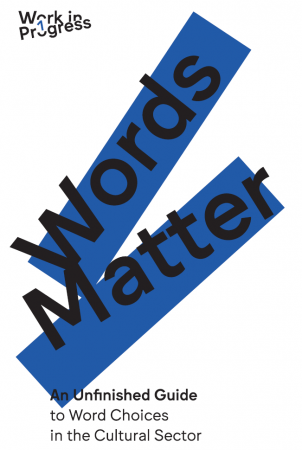ACTIONS
- Protect and safeguard cultural and natural heritage
- Learning and educational opportunities
- Cultural participation/social inclusion
- Sustainable tourism
- Support research
- Employment (recruiting, training, safety)
- Energy consumption, greenhouse gas emissions
- Waste management and reduction
- Transport (forms of, energy use)
- Commercial activities including copyright and IP
- Governance and management
- Security, disaster preparedness, risk reduction
- External partnerships and collaborations
- Toolkit/framework/roadmap
Words Matter: An Unfinished Guide to Word Choices in the Cultural Sector

Intended Audience
Museum professionals, particularly those working with colonial collections
- The National Museum of World Cultures (Tropenmuseum, Afrika Museum, Museum Volkenkunde, Wereldmuseum)
“With this publication the four museums have contributed to the dialogue about word use in the museum world and have joined the social debate on whether certain words are appropriate today. The publication explains that the description of an object has just as much meaning as the object itself. This can help us to understand why a word that has no connotations for one person is particularly sensitive to another. WORDS MATTER provides insight and alternatives.”
Avaiable in
- English
- Dutch
SDGs LINKAGES
The resource is most closely related to SDGs 10.2 (ensure the full social, political and economic inclusion of all) and 10.3 (ensure equal opportunity and reduce inequalities of outcome), 10.4 (adopting policies that support equality for all), and 11.7 (welcoming green and public spaces).
Other SDGs support by this resource include 4.5 (removing barriers to education), 9.1 (research-useful collections), 16.6 (effective, accountable and transparent institutions), and 16.10 (protecting fundamental freedoms).
Click on the SDG Target to discover Our Collections Matter indicators
-
Our Collections Matter indicators:
- Number of educational and/or training programmes drawing on collections directed to eliminate gender disparities in education.
- Number of educational and/or training programmes drawing on collections directed to meet the particular needs of persons with disabilities.
- Number of educational and/or training programmes drawing on collections directed to meet the particular needs of Indigenous peoples’ groups.
- Number of educational and/or training programmes drawing on collections directed to meet the particular needs of children in vulnerable situations.
-
Our Collections Matter indicators:
- Development of research-useful collections to support reliable, sustainable and resilient use by researchers and others.
- Number and proportion of collections facilities and stores that support economic development and human well-being.
- Number and proportion of collections facilities and stores that provide affordable and equitable access for all.
- Investment in collections facilities.
- Inclusion of collections information in regional and transborder initiatives, notably via digital access for discoverability.
-
Our Collections Matter indicators:
- Collections development to ensure that collections effectively meet the needs of all, irrespective of age, sex, disability, race, ethnicity, origin, religion or economic or other status.
- Number and proportion of educational and participatory programmes that promote participation irrespective of social or other status.
- Numbers and proportions of people making use of collections in relation to the demographic of the local population.
- Numbers and proportions of people involved in focused programmes aimed at promoting social, economic and political inclusion.
- Numbers and proportions of people from different demographic groups involved in decision-making processes relating to collections and collections-based institutions.
- Number and types of partnerships that build relationships with marginalized groups, individuals and communities.
-
Our Collections Matter indicators:
- Identification of discriminatory policies and practices, with clear plans to address these, to ensure equal opportunity for all and reduce inequalities of outcome.
- Collections development to uphold and promote legislation and anti-discriminatory perspectives, with the aim of reducing inequality within and between countries.
- Education and participatory programmes that promote anti-discriminatory legislation, policies and action, with the aim of reducing inequality within and between countries.
- Research that supports anti-discriminatory legislation, policies and action, with the aim of reducing inequality within and between countries.
- Participation in partnerships that promote anti-discriminatory legislation, policies and action, with the aim of reducing inequality within and between countries.
-
Our Collections Matter indicators:
- Number and proportion of policies that proactively address equality issues relating to fiscal, wage and social protection considerations.
-
Our Collections Matter indicators:
- Numbers of people accessing collecting institutions from different demographic groups, notably women, children, older people and persons with disabilities.
- Increases in numbers of people accessing collecting institutions from different demographic groups.
- Measures taken to remove barriers to access green and public spaces.
- Extent of green space provided by collections institutions.
-
Our Collections Matter indicators:
- Proportion of the population [audience/users/non-users] satisfied with their last experience of public services.
- Access to information, and accountability policies and mechanisms, in place.
- Effective institutional arrangements, both for own working and for working in partnership with other sectors, in place.
- Plans and arrangements in place for extraordinary circumstances such as natural and human-caused disasters.
- Effective arrangements in place to fulfil legal and social obligations and responsibilities.
- Effective arrangements in place for transparent communication and reporting of institutional performance.
- Effective arrangements in place for transparent decision-making and accountability.
-
Our Collections Matter indicators:
- Adopt and implement constitutional, statutory and/or policy guarantees for public access to information.
- Plans in place, and plans implemented to enhance public access to information relating to collections.
- Plans in place, and plans implemented to support fundamental freedoms, in line with human rights, national and international agreements and legislation.
- Plans and procedures in place for public access to information relating to the operation and management of collections-based institutions.
- Complaint mechanism in place for public to use where public access to information and fundamental freedoms not supported or fulfilled.
